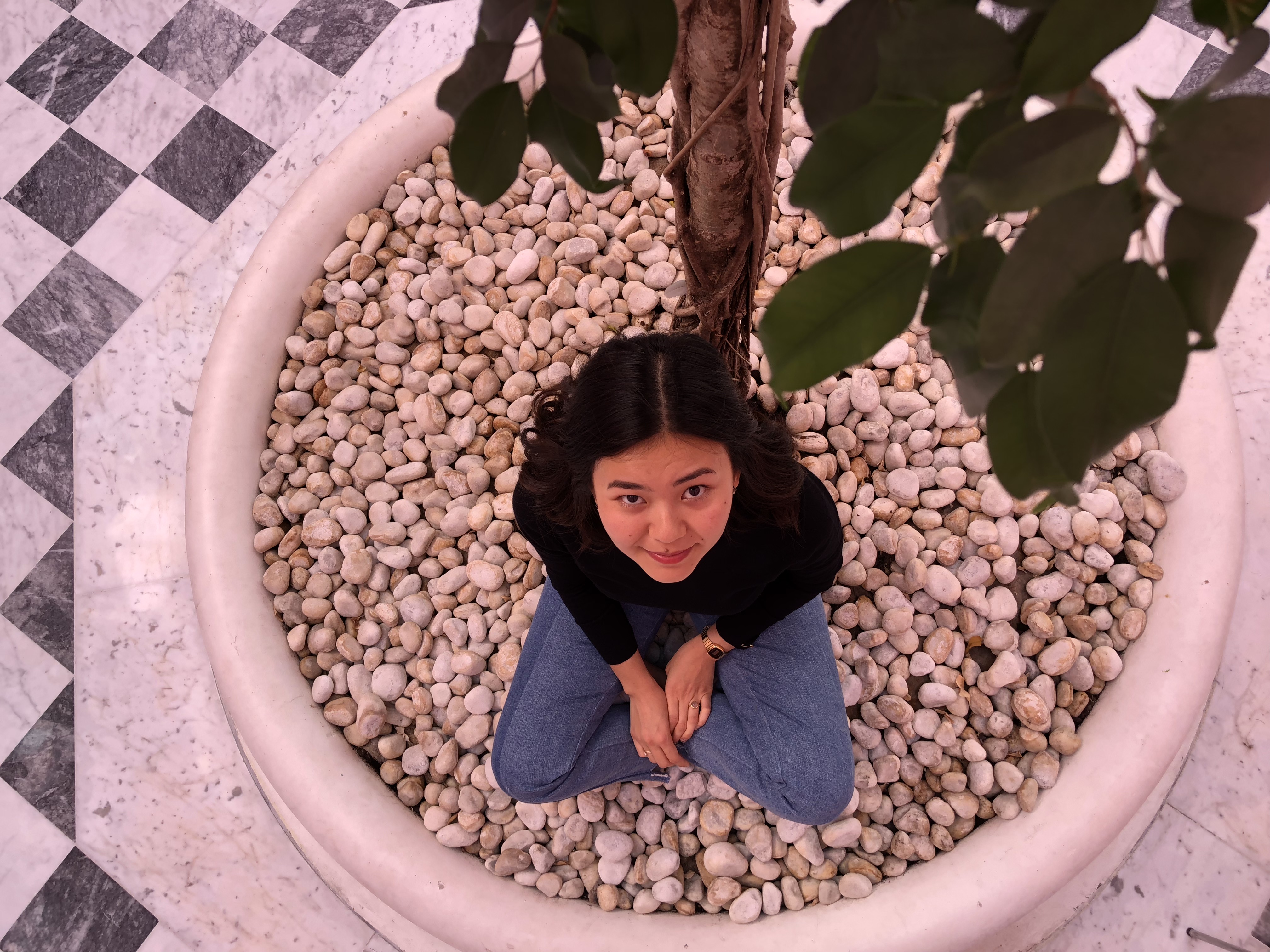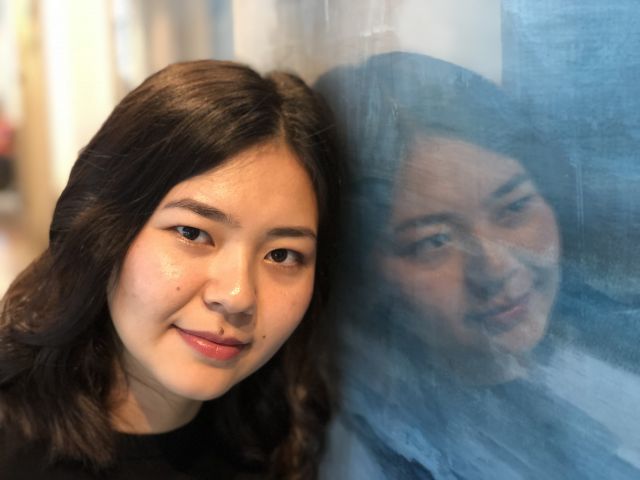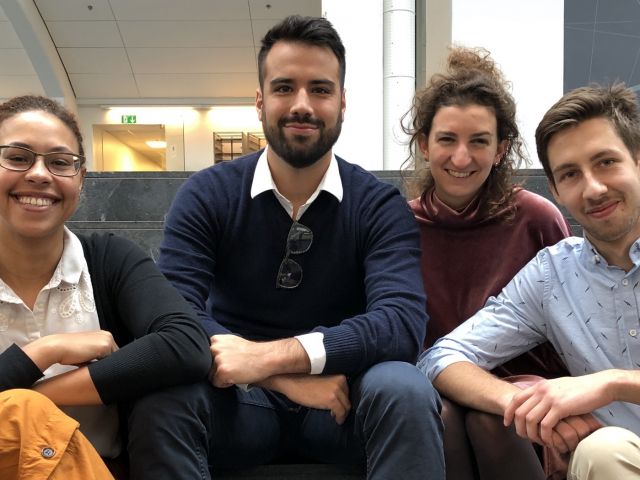Fuck it, let’s sound like baby chicken!

Madina Balgabek (Photo: Mette Koors)
When it comes to languages, accents and grammar I come alive. I enjoy learning languages to such a degree that I did an online course in Japanese from Sweden for the whole semester FOR FUN.
I think I’m a desperate perfectionist when it comes to languages and I want to speak it as close to mother tongue standard as possible. So when I think of Danish, my hands just drop.
I’ve met so many foreigners at CBS and outside who support my frustration with Danish, the language of 99% exceptions and basically no solid rules. I find it enormously difficult to crack the learning process in an organized manner because of this problem.
I know some would question why I bother learning Danish when so many people speak decent English, but it’s important for me to speak the language of a place where I want to settle down. I like the saying: When in Rome, do as the Romans do.
Of course, you can’t stop doing things in the way that you’re used to. But in terms of language, I believe people need to at least try to learn the local language, especially if they plan to stay longer than just an exchange or a period at a university.
I started learning Danish the same way I started with English by going to language school and taking classes. Maybe it’s best if I tell the story of how I learned English.
My mom has a very USSR-y way of motivating
I started learning English when I was 12 years old at school where we spent about six months learning ABC and how each letter sounds. From there, the English classes in the years that followed were all about translating texts from and to English and Russian. Not much of a learning experience I would say.
When I turned 15 my mom and I talked about going to China for my bachelor and for that I would need to learn English, so we decided to take additional English classes to get better. I spent three academic years, three times a week at an afterschool English course, staying until eight or sometimes nine in the evening.
The first year, when I thought nothing could be worse than this horrible language with its way of writing one way and reading another, my mom said, “If you want to give up and go sweep the streets, that’s okay – or you can get your shit together and get through it”. My mom has a very USSR-y way of motivating. It gave me the strength to continue and find ways to get better.
So I started learning Avril Lavigne’s song lyrics (remember I was 15-16, so no judging) and I even found an English-speaking club that met up every Thursday evening where an American guy named Brandon would come and talk to us mere mortals.
Brandon was a guy who didn’t know what to do with his life. So he joined a company that sends people around the world to teach English. He helped me overcome the fear that others would judge my pronunciation, grammar and intonation. He was probably the reason I have more of an American-ish accent than Russian or Kazakh.
After I graduated from high school, I started my bachelor in English where my professor gave my language skills 3 out of 6. Boo! It really clicked in my head that I should excel in English, so I worked hard towards getting into all sorts of activities that were in English, including volunteer interpreting at a puppet festival.
When it comes to languages, accents and grammar I come alive
When I moved to Japan for my first exchange, I would get exhausted just speaking English because I had to constantly remember the correct form of a word or use the right tense and construct my sentences in English and not in easy Russian. Okay, I agree here that I’d rather learn English as my second language instead of Russian.
Russian is the opposite of Danish with tons of rules and subrules, and if you forget one – you’re done. Years have passed and now I feel very comfortable speaking and thinking in English. I like how it sounds and how it feels. For some reason I feel freer speaking English compared to Russian (sorry, Motherland).
Back to Danish, none of the rules for English work here. None. Luckily in Denmark the first couple of years are free of charge so I didn’t have to pay for my education. But I failed big time on the goal of being fluent in two years.
I don’t really like Danish songs. For some reason they all sound like folk music or very questionable copyright cases of the American top 100 charts. I don’t really enjoy Danish movies or TV shows.
Russian is the opposite of Danish with tons of rules and subrules, and if you forget one – you’re done
I watched the hyped Netflix series, The Rain and didn’t understand what was so cool about it. I find it extremely difficult to learn a language if you don’t enjoy that country’s music or movies. The only decent way of learning the language was to say, “Fuck it, let’s sound like baby chicken” and talk like a two-year-old baby to the cashier, pharmacist and a lady at the post office.
I’m lucky to have in-laws who are very supportive in terms of my poor attempts to speak Danish. So each time I visit them, they ‘rose mig’ (praise me) about how much I’ve improved. I admit it feeds my esteem tremendously as long as I don’t overthink why they say it.
Another problem with Danish is that some accents irritate me and I just hate hearing people speak. But lately I found a podcast on Spotify that I really enjoy having in the kitchen while preparing breakfast or dinner. It is called ‘Sitter – med Signe Lindkvist og Iben Hjejle’.
I probably understand 30-40% of what they’re saying, and I really enjoy their voices and how they sometimes change them to sound funny or silly. Another helpful method is to borrow small children’s books from the library, preferably a story that I’ve already read in Russian or English, so it’s easier to understand because I already know the plot. Why small? Because they fit in my bag and I hate reading big novels.
Depending on my mood and degree of devotion, I go from books for small children to teenagers. The fourth year of learning Danish has begun so let’s see how it’ll go this year. Wishing all my sisters and brothers in the same situation LOTS OF LUCK! We can do it!




































































































































Comments